What Is Gastritis?

Causes of Gastritis
Gastritis can result from bacteria in the stomach called Helicobacter pylori or H.pylori. It’s a common stomach bacteria that causes h.pylori gastritis, a stomach infection that can cause stomach ulcers. Inflammation of the stomach can also be caused by autoimmune conditions. When h. pylori bacteria are identified as the cause of gastritis through endoscopy or by a breath or stool test, h. pylori treatment in the form of antibiotics is prescribed.
Drugs, particularly nonsteroidal anti-inflammatory medications, alcohol, and other substances, can also cause damage to the intestinal lining. Your doctor can perform an upper endoscopy to visualize the entire stomach and take biopsies to establish a diagnosis. Gastritis should always be evaluated with a thorough consultation and examination by a physician to ensure an accurate diagnosis and treatment plan and to rule out any underlying serious illness or condition.
”
★ ★ ★ ★ ★The entire staff was welcoming and made the visit quick and seamless. The office is clean, and the staff even make a point in offering coffee or water while you wait. The doctor was very friendly and to the point. Highly recommend choosing this office.
Though symptoms of gastritis are not always present, they can include the following:
- Indigestion specifically in your upper abdomen that may become either worse or better with eating
- A pronounced feeling of fullness after eating
- Nausea
- Bloating
- Frequent belching
- Vomiting
Risk Factors for Gastritis
Risk factors for developing gastritis include:
- Extreme alcohol consumption
- Routine use of nonsteroidal anti‐inflammatory drugs (NSAIDs) like ibuprofen and aspirin
- Stress caused by severe injury, illness, or surgery
- Autoimmune disorders
- Digestive disorders like Crohn’s disease
- Viral infections
Diagnosing Gastritis
An upper endoscopy allows the specialist to fully visualize the stomach and obtain biopsies. Gastritis can be visualized grossly at times, and we can also see it under a microscope. After the specialist establishes a diagnosis, gastritis is treated based on its underlying cause. Common treatments include avoidance of causes such as NSAIDs and treatment of h. pylori bacteria.
Treating Gastritis
Gastritis is typically treated with prescription medications to reduce the amount of acid in the stomach, allowing it to heal. Other treatment options based on the diagnosis are available, and your gastroenterologist will be able to customize your treatment based on this information.
How Long Does Gastritis Take to Heal?
Acute gastritis typically lasts a few days or weeks and can resolve on its own once the inflammation has subsided. However, it can sometimes become chronic due to recurrent or long-term inflammation of the gastric mucosa. It is not uncommon for chronic gastritis to persist for months or even years if remained untreated, putting the patient at increased risk of developing other complications.
Complications of Gastritis
Gastritis can last for a long time if not managed properly, putting you at risk of developing:
- Stomach ulcers. Prolonged exposure to gastric acid can cause damage to the stomach lining, leading to painful sores in your upper digestive tract. An ulcer that breaks through a stomach wall can spread bacteria into the abdomen, potentially resulting in a dangerous infection or even life-threatening sepsis.
- Atrophic gastritis. Gastritis caused by long-standing H. pylori infection or an autoimmune disorder can damage the stomach’s protective mucus layer, resulting in increasing loss of gastric glands. This can lead to an onset of iron deficiency anemia, pernicious anemia, and a higher risk of gastric cancer.
- Gastric polyps or tumors. These are benign or cancerous abnormal growths that form on the inside lining of your stomach.
If you are experiencing gastritis-related symptoms, it is critical that you seek the help of a highly experienced gastroenterologist to ensure a successful recovery and prevent serious complications.
What to Eat with Gastritis?
Certain dietary changes are recommended for those living with gastritis in order to reduce and relieve their symptoms. These are some examples:
- Eat more frequent or smaller meals
- Do not eat right before going to bed
- Cut back on highly processed foods
- Limit or avoid alcohol, spicy foods, and caffeine
Instead, supplement your meals with fresh fruit and vegetables and focus on a variety of healthy foods from different food groups. These include high-fiber foods, lean meat, whole grains, fish, eggs, and low-fat dairy products. Remember that if you fail to treat underlying causes such as H. pylori infection or continue eating trigger foods, diet changes may fail to improve your symptoms.
Doctor’s Note: The only intent of this information is to provide general information about gastritis, not definitive medical advice. Please consult our gastritis specialists about your specific condition for a conclusive diagnosis. Only trained, experienced gastroenterologists can determine an accurate diagnosis and proper treatment.
As best-in-class NYC gastroenterologists, our doctors provide highly personalized and comprehensive care. For more information about gastritis or to schedule a consultation, please contact our NYC gastroenterology offices.

